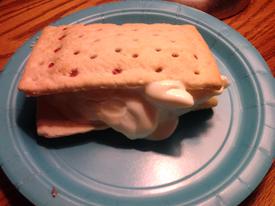Can you lose BF monthly?

kassiebby1124
Posts: 927 Member
I just a question. Realistically speaking, if my diet was pretty awesome (maybe a casual slip up, I suppose, but generally clean), would it be realistic to see a lose of 1% body fat a week or at least 3% a month? I know it would slow down the closer I got, but I have to get there first and I have a long ways to go :P
0
Replies
-
I know you got a little confused in the other thread about the math. Let me see if I can give an example with easy to follow numbers...
Let's take someone at 200 pounds and 30% BF. That means the fat weighs 60 pounds. They lose 20 pounds and 75% of the loss is fat (that is an estimate, but probably a pretty good one). So they lost 15 pounds of fat and now have 45 left. They lost 20 pounds, so the total weight is 180. 45 is 25% of 180, so they lost 5% of BF. They lost 1% of BF for every 4 pounds.
There are estimates in there, but they are likely to be roughly accurate. I think someone in the 200 pound range should expect to see a 1% drop in BF for every 4 or 5 pounds lost. As you continue to lose and the BF% gets lower, it will get slower.0 -
Oh okay thanks. But, thought that you would maintain a relatively similar weight if you lift?I know you got a little confused in the other thread about the math. Let me see if I can give an example with easy to follow numbers...
Let's take someone at 200 pounds and 30% BF. That means the fat weighs 60 pounds. They lose 20 pounds and 75% of the loss is fat (that is an estimate, but probably a pretty good one). So they lost 15 pounds of fat and now have 45 left. They lost 20 pounds, so the total weight is 180. 45 is 25% of 180, so they lost 5% of BF. They lost 1% of BF for every 4 pounds.
There are estimates in there, but they are likely to be roughly accurate. I think someone in the 200 pound range should expect to see a 1% drop in BF for every 4 or 5 pounds lost. As you continue to lose and the BF% gets lower, it will get slower.0 -
Hopefully, someone that does a lot of lifting will clarify, but my understanding is that even with lifting you have to cycle your weight, losing fat by eating at a deficit and losing weight and then gaining muscle by working hard and eating slightly above TDEE. I don't want to start a debate with lifters, but it is also my understanding that to add enough bulk to make a meaningful difference in metabolism so you can burn fat faster is very difficult.Oh okay thanks. But, thought that you would maintain a relatively similar weight if you lift?0 -
Lifting makes it so when you eat at a calorie deficit, you lose 75% of your loss fat. If you weren't lifting you'd only lose 50% fat, with the remainder being muscle.
No lifting = 1lb of weight loss is 50% muscle, the other is 50% fat
Lifting = 1lb of weight loss is 25% muscle, the other is 75% fat
If you lose muscle and fat at the same rate (50%) you're pretty much keeping your bodyfat the same.
Of course all of these % are monthly.
I'd aim for a goal loss of 1 - 2% a month, then when you get to ~23%, .5% a month.
Edit:
Oh. Bulking and Cutting.
Okay so a lot of seasoned lifters will cut (diet) for 6 to 8 weeks, just to get their weight down, they lift ~2 - 3 times a week to maintain their muscle. Then at the end of their cut, they eat in a surplus to gain weight (muscle) while they lift 3 - 4+ times a week.
When you gain weight, you gain muscle and fat. So at the end of the bulk you have to cut again to lose the extra fat, etc etc.
If you really must have a time frame, it'll take probably a year of dedicated lifting with something like Stronglifts0 -
Thanks! I guess I have a long road to go on. I mean, I don't have a time limit or anything, but I like setting time frames.0
-
As I said, I hoped this would not become a debate but I think that is exaggerated. The numbers I have seen in studies on obese dieters come in at 70% to 80% fat loss with the 70% being those that don't exercise and the 80% being those that do. Fat has 3500 calories per pound and has no job other than to provide fuel when you are in deficit. Muscle only has 600 calories per pound and has another job. Your body generally does a pretty good job of picking the best fuel.Lifting makes it so when you eat at a calorie deficit, you lose 75% of your loss fat. If you weren't lifting you'd only lose 50% fat, with the remainder being muscle.
Once you have lost a lot of BF and are trying to lose the last few pounds and/or bulk up it is another story and you can lose a lot of muscle when there aren't vast stores of fat.0 -
You lost me again..I'm sorry I'm so slow ><
As I said, I hoped this would not become a debate but I think that is exaggerated. The numbers I have seen in studies on obese dieters come in at 70% to 80% fat loss with the 70% being those that don't exercise and the 80% being those that do. Fat has 3500 calories per pound and has no job other than to provide fuel when you are in deficit. Muscle only has 600 calories per pound and has another job. Your body generally does a pretty good job of picking the best fuel.Lifting makes it so when you eat at a calorie deficit, you lose 75% of your loss fat. If you weren't lifting you'd only lose 50% fat, with the remainder being muscle.
Once you have lost a lot of BF and are trying to lose the last few pounds and/or bulk up it is another story and you can lose a lot of muscle when there aren't vast stores of fat.0 -
The other poster is saying that you will not drop BF% unless you lift while losing. I am saying that you will but that exercise will make it drop faster. Lots of people drop their BF% into the low 20s with no exercise (I am not saying that is a good idea) but to get it below 20 you have almost have to be athletic or extremely patient.0
-
Oh! That I understand (:0
-
Lifting = 1lb of weight loss is 25% muscle, the other is 75% fat
WHAT ?!! this is non sense ...i have gone from over 25 % to 9 % with 1 pound of muscle loss in the last week of cutting because i ate little to accelerate the process ..if what u are saying is true then i would have lost like 15 or more pounds of muscle during my cut ..btw i used Tanita scales to measure my muscle to fat ratio ..and my lifts remained the same ..and actually some lifts increased ..0 -
If you lift while on a deficit you will still lose actual weight, but it might be slower since you are losing mostly fat instead of some fat an some muscle (I don't think you anyone can put percentages on this), and it might be masked by water retention, swelling, glycogen, etc. In order to lose fat and stay at the same exact weight you'd have to be gaining muscle at the same weight you are losing fat. This isn't possible on a deficit. Some people can do this eating right at maintenance or slightly above.0
-
There are a lot of variables here.... But when someon FIRST starts lifting, their body is going to build muscle much faster than someone thats been doing it a while.
So when you first start lifting you may only see smaller fluctuations in weight loss, as some of the weight loss is being offset by muscle gain. This accelerated state does not last and eventually muscle gain will slow, while fat loss continues. This is when the numbers start to fall more. Once you get to a certain point, fat loss and muscle gain together becomes very difficult if not impossible. In deconditions people however, this is not the case. As a general rule, muscle gain takes much much longer than fat loss.
What to take away? Just keep lifting, and use measurements/calipers, and don't focus much on the scale. Cardio is also important, but in my opinion, most of your time exercising should be spent lifting. Unless you happen to have a cardio activity you enjoy...in that case its always good to do that 0
0 -
This argument can get to the point of sillyness by trying to predict actual percentages of fat/muscle loss.
Consider, most estimation methods of bodyfat separate into two categories. Fat mass and LBM or Fat Free Mass. The latter being everything that isn't fat.
When you lose weight, both of these go down but that doesn't necessarily mean that you are losing skeletal muscle.
If you are doing some form of resistance training, you are consuming a reasonable caloric and macronutrient intake, and you aren't striving to push the limits of leanness, you are likely doing the things you need to do to minimize muscle loss.0 -
Curious now.
Are you going to be doing weight lifting?0 -
I thought this was a thread about boyfriends.
Why not just measure BF and come back with how you made out?0 -
Lifting makes it so when you eat at a calorie deficit, you lose 75% of your loss fat. If you weren't lifting you'd only lose 50% fat, with the remainder being muscle.
No lifting = 1lb of weight loss is 50% muscle, the other is 50% fat
Lifting = 1lb of weight loss is 25% muscle, the other is 75% fat
If you lose muscle and fat at the same rate (50%) you're pretty much keeping your bodyfat the same.
Of course all of these % are monthly.
I'd aim for a goal loss of 1 - 2% a month, then when you get to ~23%, .5% a month.
Edit:
Oh. Bulking and Cutting.
Okay so a lot of seasoned lifters will cut (diet) for 6 to 8 weeks, just to get their weight down, they lift ~2 - 3 times a week to maintain their muscle. Then at the end of their cut, they eat in a surplus to gain weight (muscle) while they lift 3 - 4+ times a week.
When you gain weight, you gain muscle and fat. So at the end of the bulk you have to cut again to lose the extra fat, etc etc.
If you really must have a time frame, it'll take probably a year of dedicated lifting with something like Stronglifts
Can you provide link to the source? where did you get those numbers from?
Bodybuilders cut and bulk and they manage to retain 100 or almost 100% of the muscle when cutting as they eat a lot of protein and lift, I have seen variety of numbers but never 50% 50% split for non lifters...0 -
I got it calculated at the gym, and lost 8% of BF in 3.5 months. I also gained 2 lbs of muscles, which is supposedly impossible when eating at a deficit.
So *shrug*. Obviously I don't know how accurate it is, but they use measurements and some sort of tool they put on your arm to measure it...0 -
That is true; the figures I read on BF loss were fat versus not fat, but in obese people losing weight they were pretty consistently in the range of 70-80% fat. When you have a lot of fat, that is what the body primarily uses first. But it is jumping to a poor conclusion to say everything that isn't fat is muscle.This argument can get to the point of sillyness by trying to predict actual percentages of fat/muscle loss.
Consider, most estimation methods of bodyfat separate into two categories. Fat mass and LBM or Fat Free Mass. The latter being everything that isn't fat.
When you lose weight, both of these go down but that doesn't necessarily mean that you are losing skeletal muscle.
If you are doing some form of resistance training, you are consuming a reasonable caloric and macronutrient intake, and you aren't striving to push the limits of leanness, you are likely doing the things you need to do to minimize muscle loss.0 -
Estimations. Honestly I was trying to make it easier for OP since they didn't really understand it all too much and 50 / 75 were good benchmark numbers (actually I only said 75 cause the poster before me did), and saying the difference is only 15% percent or something between lifters/non-lifters might seem small enough to not yield the results the OP wants, thus not worth it when it is.Can you provide link to the source? where did you get those numbers from?
Bodybuilders cut and bulk and they manage to retain 100 or almost 100% of the muscle when cutting as they eat a lot of protein and lift, I have seen variety of numbers but never 50% 50% split for non lifters...
You can't maintain 100% LBM when you're in a caloric deficit. You can if you eat at TDEE.0 -
I agree.You can't maintain 100% LBM when you're in a caloric deficit.
I want so badly to agree but I think there is a flaw in your thinking. There is no loss at TDEE, that I agree with. No LBM and also no fat. I inferred that you were thinking you can get fat loss with no LBM loss. That I don't agree with. I think you can gain muscle without gaining much, if any, fat but that you can never lose nothing but fat. Hence the bulk/cut cycles.You can if you eat at TDEE.0 -
I got it calculated at the gym, and lost 8% of BF in 3.5 months. I also gained 2 lbs of muscles, which is supposedly impossible when eating at a deficit.
So *shrug*. Obviously I don't know how accurate it is, but they use measurements and some sort of tool they put on your arm to measure it...
Ditoim the same, managed to gain muscle density and lower BF%, people who have alot of body fat to loose can build a small amount of lbm whilwe on a defict, the calories that are required come fromt he excess body fat you want to loose. However when you get to a certain level you will see a natural platau where you wont be able to gain LBM with a lower BF% thant when you started.
I was 6 stone over weight so this enabled me to gain alittle LBM during my first month but Im expect to see a decline in result when my BF % goes down.0 -
Proportion of weight loss that is fat from weight loss studies (not body building studies)
 0
0 -
I just a question. Realistically speaking, if my diet was pretty awesome (maybe a casual slip up, I suppose, but generally clean), would it be realistic to see a lose of 1% body fat a week or at least 3% a month? I know it would slow down the closer I got, but I have to get there first and I have a long ways to go :P
Not really. That would need an initial weight loss of at least 4 lbs/week from a 195 lb / 48% fat starting point. (the OP)
At 175 / 27% starting point weight loss needs to be at least 2.5 lbs/week. ( me )0
This discussion has been closed.
Categories
- All Categories
- 1.4M Health, Wellness and Goals
- 396.9K Introduce Yourself
- 44.2K Getting Started
- 260.9K Health and Weight Loss
- 176.3K Food and Nutrition
- 47.6K Recipes
- 232.8K Fitness and Exercise
- 454 Sleep, Mindfulness and Overall Wellness
- 6.5K Goal: Maintaining Weight
- 8.7K Goal: Gaining Weight and Body Building
- 153.3K Motivation and Support
- 8.3K Challenges
- 1.3K Debate Club
- 96.5K Chit-Chat
- 2.6K Fun and Games
- 4.5K MyFitnessPal Information
- 16 News and Announcements
- 18 MyFitnessPal Academy
- 1.4K Feature Suggestions and Ideas
- 3.1K MyFitnessPal Tech Support Questions










